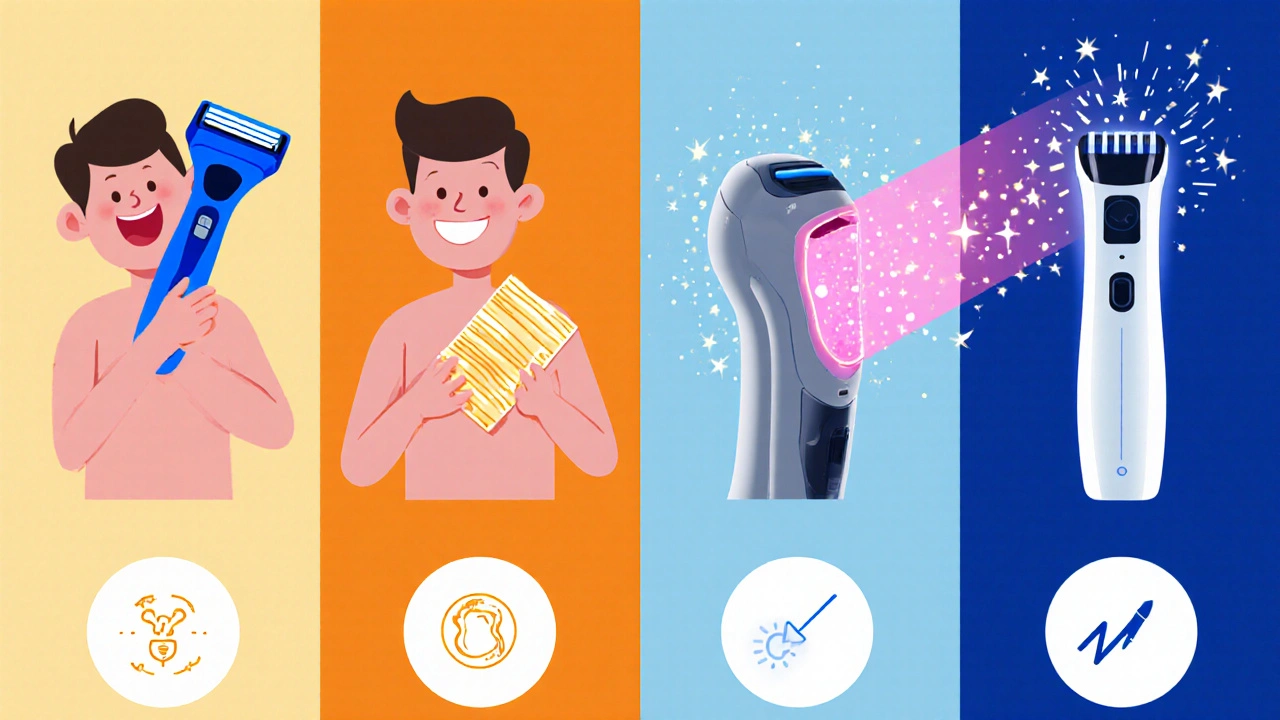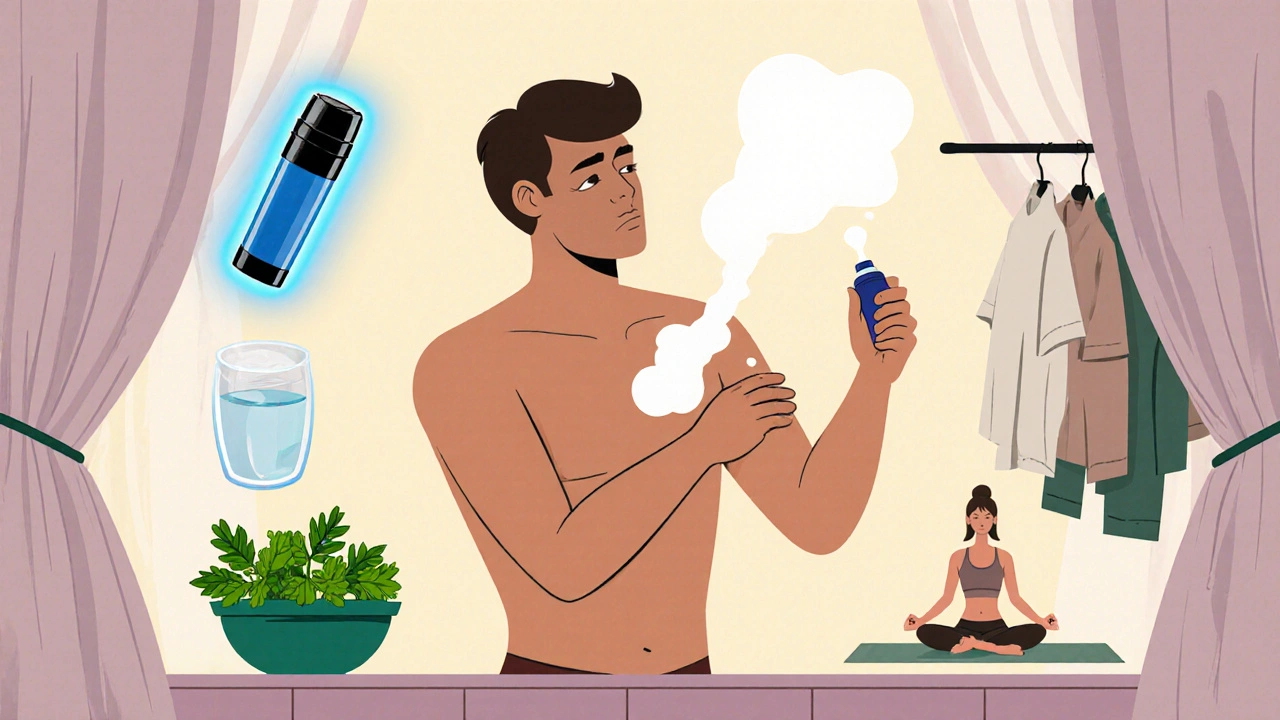Hair Removal Method Finder
Find Your Best Hair Removal Method
Select what matters most to you to find the hair removal method that matches your needs.
Recommended Method
Your Method Comparison
Pros
Cons
Dealing with excessive hairiness and stubborn body odor can feel like a double whammy. The good news? You don’t need a miracle cure - just a clear plan and the right tools.
What’s really going on?
First, let’s break down the two issues. Excessive hairiness is a condition where hair growth is noticeably denser or more widespread than typical for a person’s gender, age, or ethnicity. It often stems from genetic factors, hormonal imbalances, or certain medications. Meanwhile, Body odor is the smell that results when sweat mixes with bacteria on the skin. It’s not just sweat - it’s what the microbes produce.
Why do they often appear together?
When you have a lot of hair, especially in areas like the underarms or groin, it creates a warm, damp environment. That’s a perfect breeding ground for the bacteria that cause odor. Add in hyperhidrosis (excessive sweating) or hormonal spikes, and the smell can become noticeable even after a quick shower.
Step‑by‑step: Taming excessive hairiness
- Identify the cause. Talk to a doctor if you suspect a hormonal issue (thyroid, testosterone, estrogen), medications, or an underlying condition like polycystic ovary syndrome (PCOS).
- Pick a removal method. Below is a quick comparison of the most common options.
- Maintain skin health. After any removal, keep the area moisturized and avoid tight clothing that traps moisture.
| Method | Effectiveness | Cost | Typical Pain Level | Maintenance |
|---|---|---|---|---|
| Shaving | Immediate, short‑term | Low | Low | Every 1‑3 days |
| Waxing | Up to 4 weeks | Medium | Medium | Every 3‑4 weeks |
| Laser hair removal | Long‑term (months to years) | High (multiple sessions) | Low‑medium | 1‑2 sessions per month for 6‑12 months |
| Electrolysis | Permanent | High | Medium‑high | Weekly to monthly sessions |

Step‑by‑step: Keeping body odor at bay
- Cleanse wisely. Use an antibacterial soap on high‑risk areas (underarms, groin) once a day. Over‑washing can strip natural oils and actually increase bacterial growth.
- Choose the right deodorant. Look for products that contain antiperspirant ingredients like aluminum chloride to reduce sweat, plus fragrance to mask odor.
- Watch your diet. Foods high in sulfur (onions, garlic) and excessive caffeine can amplify odor. Adding fresh herbs like parsley or mint can help neutralize smells.
- Stay hydrated. Drinking water dilutes sweat and reduces the concentration of odor‑producing compounds.
- Mind your clothes. Natural fabrics (cotton, linen) let skin breathe. Change socks and underwear daily, and consider moisture‑wicking athletic wear for workouts.
Lifestyle tweaks that make a difference
Stress spikes adrenaline, which can trigger both sweat and hair growth cycles. Simple stress‑busting habits-short walks, deep‑breathing exercises, or a quick yoga flow-can lower the hormonal cascade that fuels odor and hairiness.
Another often‑overlooked factor is skin pH. A slightly acidic environment (pH 5.5) discourages bad bacteria. Acidic soaps or a splash of diluted apple cider vinegar after showering can help maintain that balance.

Common pitfalls and how to avoid them
- Relying on scented products alone. Masking odor doesn’t solve the bacterial cause. Pair deodorant with proper hygiene.
- Skipping after‑care. After waxing or laser, the skin can become inflamed, inviting infection. Apply a soothing aloe gel and avoid tight clothes for 24‑48 hours.
- Ignoring medical advice. If you notice sudden increases in hair growth or odor despite good hygiene, get a blood test. Conditions like thyroid disorders or diabetes can be the hidden culprits.
Quick cheat‑sheet
- Identify cause → Hormones, meds, genetics.
- Pick removal: shave (quick), wax (smooth), laser (long‑term), electrolysis (permanent).
- Cleanse daily with antibacterial soap.
- Use antiperspirant + deodorant.
- Hydrate, eat low‑sulfur, add fresh herbs.
- Choose breathable fabrics.
- Manage stress, keep skin pH balanced.
Frequently Asked Questions
Can diet really affect body odor?
Yes. Foods rich in sulfur (like garlic, onions, and broccoli) release compounds that can be excreted through sweat, making the smell stronger. Drinking plenty of water and adding chlorophyll‑rich foods (parsley, cilantro) can neutralize the effect.
Is laser hair removal safe for everyone?
Laser works best on dark hair and light skin because the light targets pigment. People with very dark skin may need a different wavelength or a series of lower‑energy sessions. Always get a patch test from a qualified professional.
Why does body odor get worse after exercising?
Exercise raises body temperature, prompting more sweat. The sweat itself is odorless, but the heat encourages bacteria to multiply. Wearing moisture‑wicking fabrics and showering soon after a workout cuts the smell down.
Do antiperspirants cause health problems?
Current research shows no credible link between aluminum‑based antiperspirants and breast cancer or Alzheimer's disease. If you have sensitive skin, opt for a fragrance‑free, aluminum‑free deodorant instead.
When should I see a doctor about excessive hair growth?
If the hair growth is sudden, accompanied by acne, menstrual changes, or unexplained weight shifts, schedule a visit. Blood tests for testosterone, DHEA‑S, and thyroid hormones can pinpoint hormonal causes.


First thing you gotta do is pinpoint why your body is going full‑on jungle mode – hormones, meds, or genetics. Stop guessing and book that doc appointment now, no more excuses. Then pick a removal method that fits your schedule and budget, and stick to it like a drill sergeant. Remember, consistency beats occasional heroics every single time.
i totally get where you're coming from, and it's awesome that you're willing to tackle the root cause. just a heads up, "doc appointment" might sound a bit formal, but staying chill about it helps too.
Hey friends! 🌟 If you’re feeling overwhelmed by hair and odor, take a breath and start small – a daily antibacterial wash can work wonders. Pair that with a good antiperspirant and you’ll notice a change in just a few days. Also, stay hydrated; water really does help dilute sweat compounds. 🎉 Remember, progress isn’t always linear, but every little win counts! 😊
Exactly! 💪 And don’t forget to swap out those synthetic socks for cotton – your feet will thank you. Also, a splash of diluted apple cider vinegar after shower can keep that skin pH spot‑on. Keep the momentum going, you’ve got this! 😎
Honestly, I think you’re over‑thinking the whole hair‑removal thing. Just shave when you feel like it; nobody’s watching you in the locker room.
While your point is clear, the sentence "Just shave when you feel like it; nobody’s watching you in the locker room" contains a comma splice and could be improved for clarity: "Just shave when you feel like it-nobody’s watching you in the locker room." Additionally, avoid informal contractions in a semi‑formal discussion.
Let us contemplate the profound interconnection between epidermal flora and the socio‑psychological perception of self‑esteem; indeed, the sweat glands are not merely excretory organs but silent heralds of our internal hormonal orchestra! When hair proliferates in previously unchartered territories, it creates micro‑habitats akin to tropical rainforests, inviting bacterial colonies to feast upon sebum and keratin, thereby producing volatile odorous compounds that echo through our social interactions. This cascade, dear readers, is not merely a hygienic inconvenience but a narrative of evolutionary adaptation-where the body signals imbalance, urging us to seek equilibrium through mindful practices. Embrace the ritual of daily cleansing with antibacterial agents, for they act as the custodians of cutaneous harmony, preserving the delicate pH balance that sustains beneficial microbes while suppressing the malodorous few. Moreover, consider the dietary symphony: sulfur‑laden alliums such as garlic and onions, while delicious, release thiols that-upon perspiration-transform into pungent notes, a veritable olfactory concerto of the kitchen. Counterbalance this by ingesting chlorophyll‑rich greens-parsley, cilantro, mint-whose natural detoxifying properties act as aromatic absorbers, neutralizing the offensive tones. Hydration cannot be overstated; water serves as the universal solvent, diluting the concentration of odor‑precursor metabolites, allowing the body to excrete a milder, less perceptible vapor. In the realm of hair management, the spectrum of options-from the immediacy of shaving to the permanence of electrolysis-mirrors the spectrum of personal agency; choose wisely, for each method carries its own physiological and psychological ramifications. Laser therapy, for instance, harnesses photonic energy to target melanin, reducing follicular density while sparing surrounding tissue, yet it demands patience and multiple sessions, a reminder that transformation is often a marathon, not a sprint. Finally, stress-oh, that insidious catalyst-elevates cortisol and adrenaline, amplifying both sudoriferous activity and androgenic hair growth, thus intertwining emotional well‑being with corporeal presentation. Incorporate breathwork, mindfulness, or yoga into your routine; these practices modulate the autonomic nervous system, curbing the hyperactive sweat response and fostering a calmer internal milieu. In sum, the dance between hairiness and odor is a multifaceted choreography, demanding a holistic approach that encompasses medical insight, lifestyle adjustments, and emotional balance-only then can one truly achieve a state of enduring freshness! 🌿✨
Oh great, another post about basic hygiene.
While the article provides an exhaustive list of mitigation strategies, it fails to address the socioeconomic barriers that impede access to advanced hair‑removal technologies, thereby perpetuating health inequities among disadvantaged populations.
Great rundown! Just a quick tip: after shaving, apply a fragrance‑free soothing lotion to prevent irritation. Also, remember to rotate your deodorant every few weeks to avoid bacterial resistance. Keep it up-you’re on the right track.
It is imperative that individuals recognize personal responsibility in maintaining bodily cleanliness; neglecting such duties reflects a disregard for communal health standards and moral conduct.
One must consider the hidden agendas behind the promotion of commercial deodorants-could it be a coordinated effort by big pharma to keep us dependent on artificial solutions rather than encouraging natural lifestyle changes?